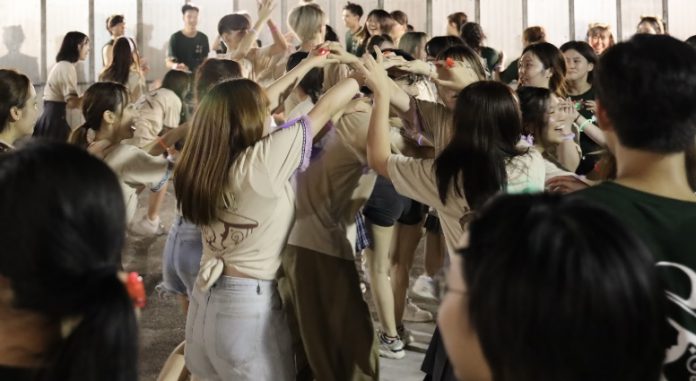Sexual assault cases were reported during university orientation camps and two men were arrested in 2023.
By Lilac Ye
On September 6, 2023, a year four student of the Education University of Hong Kong was arrested and charged with two charges of indecent assault and a third allegation of voyeurism when taking part in orientation camps.
The 28-year-old man went to six orientation camps, including a joint orientation camp hosted by the Hong Kong Red Cross. The offences are alleged to have happened over his participation in three out of six orientation activities between July and August.
According to media reports, he was reported to be an office assistant and was taking a top-up degree at the Education University of Hong Kong.
On the night of August 30, Tang Ho-yin, a second-year student at the University of Hong Kong (HKU), was arrested over the alleged sex assaults at the Po Leung Kuk Jockey Club Tai Tong Holiday Camp in Yuen Long.
According to a charge sheet available for press inspection, it was alleged that Tang, the 20-year-old man, assaulted an 18-year-old woman in an activity room on August 20. It was also alleged that he groped her again in a dormitory living room the following day.
Chief Executive John Lee Ka-chiu condemned such acts as “intolerable” and pointed out that society had expectations of university students and they should observe proper conduct.
“If there is any behaviour that is illegal or that infringes on the rights of others, schools must cooperate with law enforcement to ensure that we can deal with such conduct,” Lee said before his weekly Executive Council meeting in September 2023.
The city leader said he hoped all educational organizations, especially universities, would improve student conduct on top of providing a good learning environment.
Lawmakers also questioned the effectiveness of universities’ measures to address sexual assault allegations at camps, highlighting that similar incidents had occurred before in the meeting on October 6, 2023.
Orientation camps, also known as O’Camps, are popular among university students in Hong Kong. Senior students organize activities to welcome freshmen every year, starting from the middle of August to the start of September according to different types of O’Camp.
The well-known two O’Camps were separately held by academic departments and colleges at the Chinese University of Hong Kong (CUHK).
Despite a series of sexual assault cases were reported during orientation camps, Sky Xu Zhuohang, who studies at the CUHK, still encourages freshmen to join orientation camp, as he had a good experience when attending one hosted by Hong Kong students in 2018.
“I got my English name from a senior I met during orientation camp because he says ‘I think Sky matches your personality, can I call you Sky,’” the Social Science major student recalls.
Xu thinks mainland students tend to stress on rules when running orientation camps such as “Don’t get drunk”, “Don’t start a romantic relationship during Ocamps”, and “Don’t ask others’ grades or reveal your grades”, which are not common in orientation camps organized by Hong Kong students.
“We also have training for senior students who are responsible for taking care of freshmen in a small group and dealing with emergencies,” he says.
The Social Science student says College Orientation Organising Committees (COOC) supervised orientation camps before 2019. Senior students now are in charge, as the Student Union was folded after 2019.
“We used to follow orientation activity guidelines issued by the MUA(Mainland Undergraduate Association) under the Student Union to organize orientation events, but things have changed in recent years because of many reasons including the pandemic,” Xu adds.
Angel Yu, one of the head organizers of the O’Camp event for S.H.Ho College in CUHK in 2023, also believes that the existence of O’Camp is still necessary.
“O’Camp provides freshmen with an opportunity to make friends and become familiar with university courses. Senior students will guide them in course selection and share their experiences of university life,” the year two student says.
But Yu also mentions that people may have different experiences based on their own personalities and the friendliness of the senior students.
“Different universities also have different rules and different ways of organizing O’Camp,” Yu adds.
Responding to a series of arrests made over alleged sexual harassment at orientation camps, universities in Hong Kong introduced new measures aimed at enhancing “moral education”.
According to a document submitted to the Legislative Council Panel on Education about the management of student-led activities in universities and moral education, universities have tightened arrangements on O’Camps.
Several universities in Hong Kong, including Polytechnic University of Hong Kong, Lingnan University, Hong Kong University of Science and Technology (HKUST), City University of Hong Kong, and Shue Yan University, require approval for student-run orientation camps.
The Hong Kong University of Science and Technology says student organizations must submit activity plans in advance, attend briefing sessions, and complete online training on preventing sexual harassment.
Some universities introduce more regulations on senior students who organize events, requiring them to attend pre-orientation workshops and conduct evaluation meetings. The University of Hong Kong and HKUST specifically arrange training sessions on university guidelines for student leaders, while four other universities have similar requirements.
All leaders of student organizations at Hong Kong Baptist University are required to declare and sign the Student Leaders’ Charter, which highlights the responsibilities of student leaders.
The Education University of Hong Kong introduced several new measures, including assigning supervisor, leader and observer to monitor and report on the progress of activities, and mandatory submission of event reports and attendance lists.
Sub-edited by Eve Qiao







































